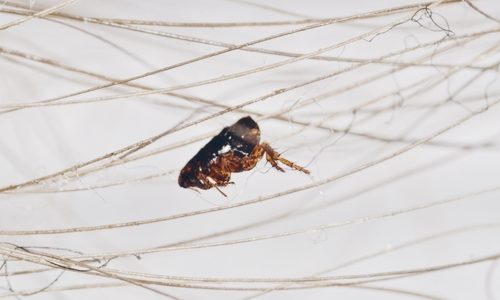
What is a flea?
Fleas are small, flat, wingless shiny reddish-brown insects that are covered in tiny, microscopic hairs. They rarely measure more than 2.5 millimeters in length.
Flea diet consists of blood collected from a living host which can be either a human or animal. They prefer hosts covered in hair such as dogs, cats, cows, rabbits, squirrels, and similar animals. When a flea lays eggs, they are not attached to its host and are instead laid in or on nearby upholstery and fabric including rugs, carpet, bedding, laundry piles, and similar areas.
Since fleas depend on blood to survive, if they’ve infested your home, it’s because they were brought in via a host like a family member or pet.
Are fleas dangerous?
Fleas do not pose direct disease transference health risks to humans, but they do bite. The itching from bites, long term, can lead to potential wounds and infections. Some people may have allergic reactions or experience the exacerbation of existing allergies or asthma.
All that said, we wouldn’t label fleas as inherently dangerous, but we do consider them to be troubling, irritating, and generally inconvenient.
What is a sand flea?
Sand fleas aren’t fleas at all. They are one of three different type of tiny crustacean that lives in sandy beaches of warm tropical areas. Because of their size and the fact they jump like fleas, they are commonly called sand fleas.
Sand fleas in the U.S. are most found along the Atlantic coast. The less common Gulf sand hopper can be found along the western gulf coast in California.
Are sand fleas dangerous? No. They are nocturnal and active when most beach visitors have gone home. While they can bite, they are more a nuisance than a threat.
Can sand fleas travel home with you? It’s unlikely. They prefer their natural sandy habitat and cannot survive in urban environments.
Why do I have fleas?
The main reason anyone gets fleas inside their home is general bad luck. You picked them up somewhere and once they found themselves inside your nice, warm, safe house with a living host to feed off of – they’ve decided to stay.
How can I prevent fleas?
There are several easy steps you can take to prevent fleas:
- Landscape. Remove vegetation build-up outside. Trim back long grass, weeds, bushes, or trees. Keep your yard away from your home’s perimeter.
- Vacuum. Clean your carpets and rugs often to suck up any eggs before they’re able to hatch.
- Check pets. Especially if they spend a lot of time outside, perform regular flea inspections on your pets. Give them a quick brush down every time they enter your home from the outdoors and use anti-flea drops on pets if they’re going to be outdoors for an extended amount of time.
How can Gregory Pest remove fleas from my home or business?
Professional flea removal is your best option. An expert exterminator from Gregory Pest Solutions is your full-service pest solutions provider specializing in the effective removal and prevention of fleas from your home or business.
Whether your problem is seeing a few or an entire family of fleas, our experts will develop a plan of action for professional flea treatment in your house or business. We know how to fumigate a house for fleas if necessary and using expert knowledge, we can guarantee you peace-of-mind.
Where can I get help with fleas?
There is no reason why you have to put up with fleas in your home. Gregory Pest Solutions offers professional flea treatment and flea removal service in these states:
Get in touch with us today to schedule a service, request a quote, or have your questions answered. Gregory is your number one provider for “flea pest control near me.”
